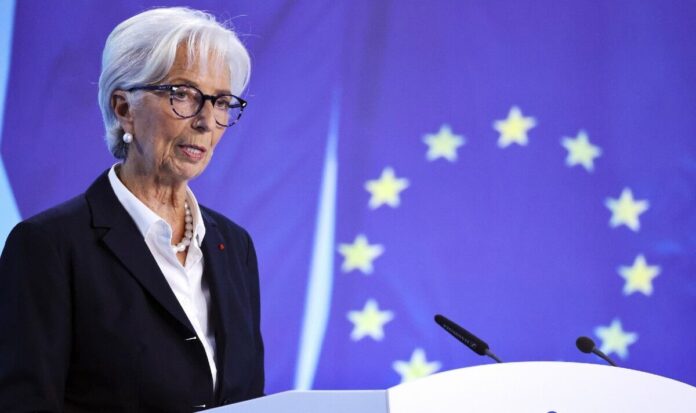The European Central Bank has raised its benchmark rate by three quarters of a percent in a bid to dampen inflation. The rate hike by policymakers in Frankfurt will have been closely watched by members of the Bank of England’s Monetary Policy Committee. On November 3, Britain’s central bank is due to make its own rates announcement.The Eurozone inflation rate is scraping 10 percent mark as it currently stands at 9.9 percent. It has already reached double digits in some countries inside the monetary union, including Germany.The ECB’s 0.75 percentage point rise represents the highest level since 2009, pushing up the cost of borrowing as recession looms.Announced after a meeting of the ECB’s Governing Council on Thursday, the hike was in line with market expectations.The ECB said in a statement it expects to raise interest rates further to ensure the “timely” return of inflation to its two percent medium-term target. Christine Lagarde, President of the European Central Bank (ECB), at a news conference in Frankfurtu (Image: Getty) The headquarters building of the European Central Bank (Image: Getty) The Federal Reserve Building seen through a fence (Image: Getty) A view of the Bank of England (Image: Getty)The same distance took 18 months to cover during its last extended hiking phase in 2005-2007 and 17 months in 1999-2000.Central banks across the world are rapidly raising interest rates, which steer the cost of credit for businesses and consumers.The Fed raised rates by three-quarters of a point for the third straight time in September.Quarter-point increases have usually been the norm for central banks, but that was before inflation spiked in the wake of higher prices for natural gas and electricity after Russia cut off most of its gas supplies during the war in Ukraine.DON’T MISS: Taxpayers footing £7m bill each day to put asylum seekers in UK hotels [REVEALED] Prince Harry’s memoir release date laid bare by industry expert [LATEST] Meghan Markle’s new podcast up for award [REPORT] UK rate changes (Image: Express)The near 40-year US inflation high of 8.2 percent is being fuelled in part by stronger growth and more pandemic support spending than in Europe.Inflation robs consumers of purchasing power, leading many economists to pencil in a recession for the end of this year and the beginning of next year in the UK, US and the 19 countries using the euro.Markets will be watching ECB President Christine Lagarde’s news conference for clues about how far the bank intends to go.Analysts at UniCredit said Ms Lagarde was not likely to provide clues about the peak level of rates but “we suspect that she will drop hints pointing to an increasing likelihood that rates will have to be raised into restrictive territory, and a slower pace of hikes following today’s bold move”. The logo and the headquarters building of the European Central Bank (Image: Getty)At the last meeting in September, she indicated three-quarters of a point was not the “norm” but added decisions are being taken on a meeting-to-meeting basis.Some analysts foresee a half-point increase at the last rate-setting meeting of the year in December and think the bank may pause after that.The ECB foresees inflation falling to 2.3 percent by the end of 2024.Higher rates can control inflation by making it more expensive to borrow, spend and invest, lowering demand for goods. But the concerted effort to raise rates has also raised concerns about their impact on growth and on markets for stocks and bonds.Years of low rates on conservative investments have pushed investors toward riskier holdings such as stocks, a process now going into reverse, while rising rates can lower the value of existing bond holdings.The head of the International Monetary Fund, Kristalina Georgieva, has warned tightening monetary policy “too much and too fast” raises the risk of prolonged recessions in many economies.The IMF forecasts global economic growth will slow from 3.2 percent this year to 2.7 percent next year.The ECB’s benchmark for short-term lending to banks now stands at two percent, a level last seen in March 2009.Additional reporting by Monika Pallenberg


